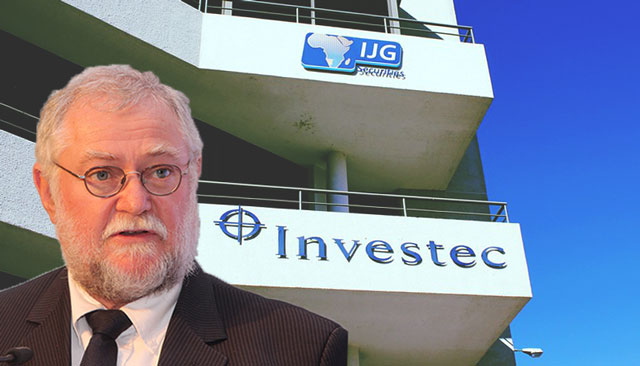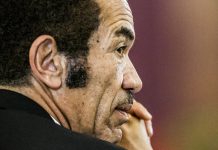By Mathias Haufiku | 12 December 2019
THE finance ministry is investigating alleged favouritism between Investec Asset Management Namibia and trustees at the Government Institutions Pension Fund (GIPF) after the arrest of two of the investment entity’s bosses.
Investec Asset Management Namibia manages N$17,2 billion of state funds from the GIPF (N$16 billion), Social Security Commission (N$800 million), Bank of Namibia (N$100 million) and N$300 million from the Guardian Fund.
Former Investec Asset Management Namibia managing director James Hatuikulipi and suspended client manager Ricardo Gustavo were arrested two weeks ago for their roles in a fishing bribery scandal in which more than N$150 million is involved.
They face charges of corruption, fraud and money-laundering, together with former justice minister Sacky Shanghala and ex-fisheries minister Bernhard Esau.
Finance minister Calle Schlettwein told The Namibian last week that his ministry had launched a probe into the relationship between Investec Asset Management Namibia officials and GIPF bosses.
He said the probe was triggered by the realisation that there were some possible linkages between the Investec managers arrested on corruption charges and GIPF trustees, adding that there is a need for his ministry as the regulator to safeguard the integrity of the financial sector.
The GIPF, the main target of Schlettwein’s probe, has the lion’s share of money invested with Investec Namibia.
The civil servants’ pension fund currently has N$16 billion out of a total N$110 billion in assets being managed by Investec.
The GIPF’s 2018 actuarial report stated that it had N$13 billion worth of assets under Investec’s management.
By September this year, the figure grew by N$3 billion, giving Investec the largest chunk of the GIPF’s assets under management.
The GIPF’s 2018 actuarial report also recorded that Namibia Asset Management was second to Investec, with N$14 billion in the GIPF’s assets under its management. Old Mutual Asset Management came a distant third with N$8 billion, followed by Allan Gray in fourth with just over N$6 billion in the government pension fund’s assets under management.
Investec’s spokesperson Kotie Basson told The Namibian last week that they were not aware of the minister’s probe, but pledged to cooperate with the investigation.
“We are making contact with the minister to ascertain whether he is indeed investigating the matters you refer to,” Basson said.
The GIPF, SSC and Bank of Namibia said they were not aware of Schlettwein’s probe.
Sources in the asset management industry alleged that Investec Namibia has over the years cemented ties with these public institutions. Industry insiders alleged that officials from these institutions benefited from trips to Europe and South Africa to attend glamorous sports events such as horse-racing.
The Namibian has been provided with the names of officials who allegedly benefited over the years.
Executives in the financial service industry also told The Namibian that it was a common industry practice for firms to entertain their stakeholders and clients. Hunting trips, expensive dinners, and shopping vouchers are all part of the game.
Basson denied claims that Investec has been using questionable means to get business in Namibia.
“We are not aware of and would never condone any unlawful or unethical conduct in relation to our clients in Namibia. But given the issues that have arisen in the fishing industry, we are investigating the matters that you referred to,” the spokesperson added.
GIPF chief executive officer David Nuyoma denied any allegations that “a favour for a favour” relationship exists between any of his management members or board of trustees with Investec.
He said the GIPF is not aware of any trips his trustees or managers undertook courtesy of Investec. The Namibian has also learned that Nuyoma has been in direct contact with Investec’s head office in London to seek assurance that the GIPF’s funds are safe, and have not been embroiled in the Fishrot scandal.
The Social Security Commission has also invested a significant chunk of its money in Investec, with the asset manager managing 20% of the commission’s N$4 billion.
With just over N$800 million in assets under management, Investec also holds the largest portion of the SCC’s money.
Other asset managers with a significant chunk of the SSC’s money are Allan Gray with over N$700 million, Prudential with over N$600 million, and Namibia Asset Management with over N$500 million of the SSC’s assets under management.
The SSC is followed by the Guardian Fund, which has just over N$300 million of its N$1,8 billion portfolio in Investec.
SSC chief executive officer Milka Mungunda told The Namibian last week that investment decisions are done above board, and that an independent consultant was hired, giving the board of trustees and the management team minimum exposure to the process.
The Bank of Namibia also confirmed to The Namibian that N$100 million of the country’s foreign reserves are invested with Investec in South Africa.
The central bank’s pension fund is also managed by Investec, but its spokesperson, Kazembire Zemburuka, refused to provide details of the pension fund.
“The pension fund of the bank is a defined contribution fund, and the bank is therefore not prepared to provide a response to this question as it pertains to specific staff matters,” he said in his response.
Zemburuka also refused to explain how the Bank of Namibia chose Investec to manage its pension fund.
ATTEMPTS
Former Investec Namibia boss James Hatuikulipi is a business partner and friend of former justice minister Shanghala.
Deals involving Hatuikulipi at state-owned entities have always raised eyebrows from industry players, with allegations that his friend Shanghala played a facilitating role in the government transactions.
Shanghala, during his time as minister, always maintained that he would not abuse his position to benefit Hatuikulipi.
The Namibian reported last month that Shanghala wanted to change the law to give the justice minister powers to control the investment of inheritance billions, which until now was under private administration.
Although Shanghala’s plans appeared aimed at reforming the fund, people familiar with the changes remained sceptical.
The GIPF also blocked Shanghala’s plan in 2017 to force them to pay a South African law firm about N$10 million to investigate how the pension body could be restructured.






